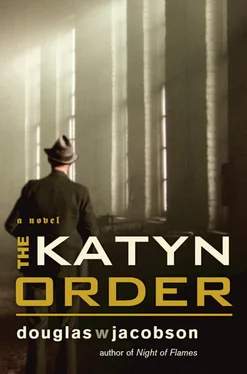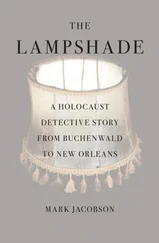He paced around the office, clearly agitated, explaining that a conference had been held at a suburb of Berlin called Wannsee. General Heydrich had presided. Finally realizing this had nothing to do with me, my fear subsided a bit and I was able to concentrate on what he was saying.
Frank’s voice dropped to a whisper as he leaned close to me. He said they had discussed a “final solution” at the conference and intended to gas all of the Jews. He asked if I could imagine it—gassing all of them. He wondered out loud how it could be possible, how it would be organized. His eyes were wide, and he stared at me for a long time, as though he were trying to envision the event. Then he abruptly snatched up the papers and waved his hand, indicating that I was dismissed.
As I stood to leave he said a remarkable thing: “I did not attend. I sent Colonel Buhler instead. Remember that, Dr. Banach.”
1 June 1942
The last five months at the library have been uneventful. Our work has progressed steadily, and Herr Kruger seems pleased. I had not seen Frank since January, then today I was summoned to his office. After inquiring about the state of the library, he informed me that he will soon be leaving for a visit to Germany to deliver a message directly to the people. He will be giving a series of public lectures, he said, emphasizing the importance of an independent judiciary within a totalitarian system and promoting the idea that a “police state” can never be tolerated. He leaned across the desk, looked me directly in the eye, and said, “This is what you and I have always believed, Dr. Banach,” as though we were still colleagues.
I was frightened by the intensity of his gaze, and all I could do was nod in agreement. He waited, as though expecting me to say something that would validate his intentions. Over the many months since my return to Krakow I have realized that Frank seems to be concerned about what I think of him. It is as though he needs someone to talk to, someone who reminds him of his former life before the madness consumed him. His comments about fighting for the “right of reprieve” for those he had arrested in the AB Aktion, about protecting the Jews from Himmler, about not attending the Wannsee conference, all of it is some attempt to make me think he is above all the brutality and murder. Yet, the hundreds of documents in room L-3 tell a very different story.
As he continued to stare at me, I finally mustered the courage to ask if he thought it wise to lecture on that subject at this time in Germany.
On his desk, Frank keeps a framed photograph of himself standing next to Adolf Hitler. He picked up the photo and looked at it closely, as though trying to make out some small detail. Then he set it down and, with a wave of his hand, dismissed me.
21 August 1942
Late this evening Frank called me to his office unexpectedly. He was sitting at his desk in his shirtsleeves, his tie undone. There was a bottle of schnapps on the desk. He poured himself a drink, swallowed it in one gulp and leaned forward. His eyes wandered about the room. He mumbled about the Fuhrer stripping him of his party offices as he rolled the empty glass between his thumb and forefinger.
“The lectures in Germany…” he started to say; then his voice trailed off. He slumped in the chair and was silent for a long time.
Then he abruptly shoved the chair back and stood up, ramrod straight. He jabbed a finger in the air and screamed, “That fucking Himmler!” He paced around the room, whispering something to himself, then stopped next to my chair, looked down at me and said that he was to remain as Governor of Poland. He asked what I thought of that but continued on without waiting for an answer. He said that he will have no power in the party but will remain as governor of Germany’s largest occupied territory. “Who has ever heard of such madness?” he said.
I believe Frank is losing his mind.
28 November 1942
It has been three months since my last entry. On most days I am too tired to write. Life has dragged on, one dreary day after another. “Night duty” continues, and the channel remains intact. I have been assured that the documents I am risking my life (such as it is) to smuggle from the library are being passed on, but the brutal oppression of the citizens of Poland continues. Deportations from the Krakow ghetto have begun, and I have heard rumors that as many as fifteen thousand Jews have already been sent “to the east.” No one knows where they are really going, but my heart sinks when I remember Frank telling me about the “final solution.” How can this madness continue? Is it possible that the rest of the world doesn’t know? Or don’t they care?
Frank came into the library early this morning. I had not seen him since that day in August when he had been stripped of his party offices. But today he was in a jovial and expansive mood, talking rapidly about how well the war effort is going, how the Russians will soon be defeated. We sat at a table in the Reading Room, and he pulled his chair close. He whispered that he had a visitor recently, a Russian visitor.
I didn’t know what to say so I remained silent, knowing this was generally the best course of action when Frank was in a talkative mood. He continued whispering even though there was no one else nearby. He said that his Russian visitor had brought him a gift as a token of his friendship. The Russian had asked for his protection when the Bolshevik empire collapses under the might of the Wehrmacht.
14 April 1943
Another five months have passed since my last writing. I fear that this journal has lapsed into tedium, but such is my life. I continue to work in the library six days a week, with “night duty” as usual. The rest of the time, I sleep. My friend Jerzy Jastremski and his wife continue to invite me to supper at their apartment, but I usually decline. I am too tired to be a good conversationalist. And I have developed a hacking cough. Jerzy wants me to see a doctor (it is allowed for workers in the library), but I fear being sent to the hospital. I remember the “hospital” at Sachsenhausen, from which no one ever returned.
Frank visited the library this evening. I was gathering up my things to leave when he motioned for me to accompany him as he walked down one of the corridors. I followed him, waiting as always for him to initiate the conversation. After several minutes he stopped and said that the German Wehrmacht made a discovery in Russia a few days ago. It was a mass grave in the Katyn Forest near Smolensk. He said the Russians had murdered more than four thousand Polish army officers back in 1940. They were shot in the head and dumped in a ditch. Frank said that Stalin is blaming Germany, but it was the Russians who committed the murders.
The news was like a blow to the stomach. I could barely breathe as I thought of the many Polish officers I knew, some of them sons of my closest friends, fine young men in the prime of their lives and professional careers. Is this what happened to them? Were they put down like dogs and left to rot in a ditch? I looked away and blinked several times, trying to clear the tears from my eyes.
Frank, of course, was oblivious to my discomfort. He said that he had known about the murders for some time. He asked if I recalled his visitor last November. Thanks to this visitor and the gift he brought, Frank said, he has proof that it was the Russians who committed this despicable act. He said that proof—solid evidence—was always useful.
15 January 1945
I return to the journal now after almost two years because something happened today that may actually provide meaning for my continued existence. For the last two years I have slogged through life, merely staying alive on the slim hope that Beata and Adam have managed to survive. And so I have kept on, one day after another.
Читать дальше












